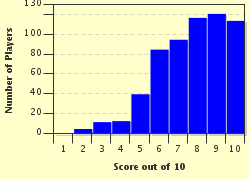Quiz Answer Key and Fun Facts
1. This often-used "U" word basically means "excessive". It also rhymes with Grand Coulee, a dam on the Columbia River.
2. This "V" word is a person you would take your pet to should it become sick or get hurt. James Alfred Wight, OBE, FRCVS, was a well-known one because of the books he wrote.
3. When you own something entirely or to the exclusion of anything else, you own it the way of this "W" word.
4. Hmmm, this "X" word is a medical term for a condition I would not want, although sometimes it is self-caused.
5. This "Y" word is the name of the skull cap normally worn by Orthodox or Conservative Jewish men. What is it?
6. Our "Z" word is one meaning a "gentle breeze from the west". Can you spell it correctly?
7. The following "A" word could be applied to one's secretary, or to a copyist. It refers to anyone that takes dictation or copies the written word of others. Spell it correctly for me, please.
8. If you are impulsive or unpredictable, your friends no doubt call you this, and probably not just behind your back.
9. This "E" word is sometimes called "photographic memory" but there are those who don't believe it's quite the same thing. In fact, there are those who don't believe in it at all.
10. For you cat owners, this "B" word is something you no doubt have seen. Perhaps you've even stepped on one. Barefoot it's most unpleasant. Spell the correct name of "hair ball", please.
Source: Author
habitsowner
This quiz was reviewed by FunTrivia editor
looney_tunes before going online.
Any errors found in FunTrivia content are routinely corrected through our feedback system.

